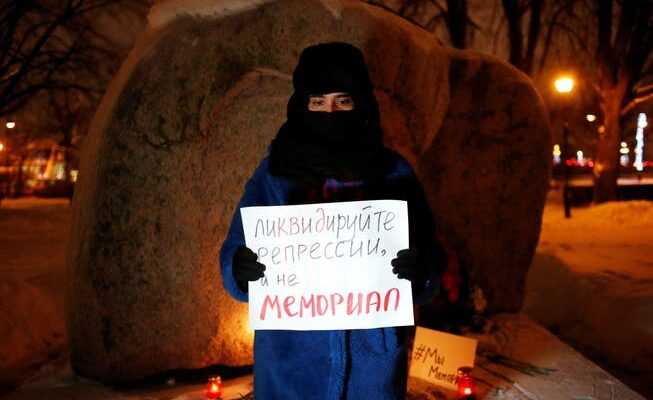International human rights organizations and all German party-affiliated foundations must cease their activities in Russia. This further restricts exchanges between East and West and increasingly chokes off those who think differently.
“Dissolve repression, not memorial,” reads the poster of a supporter of the human rights organization International Memorial in St. Petersburg. The organization was forcibly dissolved at the end of December. She had also been supported by German foundations.
With the stroke of a pen, the Russian Ministry of Justice ended another chapter of cooperation with the West over the past thirty years. The offices of thirteen foreign non-governmental organizations in Russia have had their registration revoked; this amounts to a ban on activities on the territory of the Russian Federation. Affected are, among others, Amnesty International, Human Rights Watch (HRW), the Moscow Carnegie Center and the branches of all German party-affiliated foundations and the German Research Foundation (DFG).
Signs of broken relationships
Against the background of the rapidly deteriorating relations between Russia and the West in recent years, and especially since the attack on Ukraine disguised as a “special military operation”, forced closures and bans were expected. Numerous foreign foundations had previously been obstructed, banned or even classified as “undesirable”, including the Berlin Center for Liberal Modernism and the German-Russian Exchange. This makes any cooperation a potentially criminal offense for Russian citizens.
The fact that more than a dozen organizations are now having to stop their work at the same time goes further than many observers and participants had expected. It’s a double blow: to foreign ties, on the one hand, and to the remnants of Russian civil society, on the other, who could hope for a little more oxygen to breathe through these collaborations.
It shows the complete breakdown of relations and only underlines that this dawning gloom is not – as some in the West still want to think – a short-term gloom, but a long phase of new confrontational coexistence. The closure of the Moscow Carnegie Center also proves this. His analyzes of Russian domestic and foreign policy, of Ukraine and Belarus, but also of the entire region to China by Russian scientists and publicists are among the most well-founded in the Russian-speaking world.
internal and external violence
The organizations concerned were thrown out of the country for violating Russian law. Your specific work probably played less of a role in the Justice Department’s decision than this fundamental change of times. For several years now, Russia has been in the process of cashing in on all of the liberal achievements of the past thirty years since the end of the Soviet Union and Mikhail Gorbachev’s reforms. With the war against Ukraine, this is happening more explicitly than ever.
What the «special operation» in the form of imperialist unleashing of violence has been sending outwards, the repressive state has been directing inwards for years and is now even more intense. Those who think otherwise are intimidated, branded, pushed out and morally or even physically destroyed. This applies to the opposition, the media and independent organizations.
The authorities have long objected to Amnesty International and HRW for their harsh criticism of human rights abuses in Russia. The undeterred naming of the crimes in the Ukraine war was the last straw. It is less clear in the case of the German foundations and especially the comparatively non-political DFG. For years, they benefited from the “special” relationship between Russia and Germany, which is frowned upon today. All of the foundations enabled politicians from “their” parties to make contacts while traveling and attending seminars in Russia. The privileging of Germany in Europe by Moscow is definitely over.
Partners of organizations at risk
The CDU-affiliated Konrad-Adenauer-Foundation, the CSU-affiliated Hanns-Seidel-Foundation and, albeit in somewhat different fields, the Friedrich-Ebert-Foundation, which is affiliated with the SPD, often worked closely with state or state-related structures. But they always maintained relationships with important independent actors. More focused on civil rights and opposition groups, the Friedrich Naumann Foundation for Freedom, which is close to the FDP, and the Heinrich Böll Foundation, which is linked to the Greens, were very important and protective partners of Russian organizations and groups on the fringes of mainstream society.
At least since Vladimir Putin’s return to the Kremlin in 2012, the Russian regime has stylized the West as an enemy. The work became all the more difficult for both the foreign foundations and their local partners. The former were suspected and harassed as whisperers of revolutionary activities, the latter as literally “foreign agents”. Both scope became narrower and narrower. Now he’s completely choked off.
